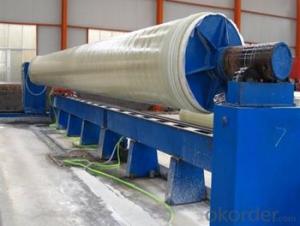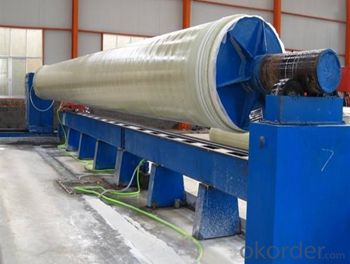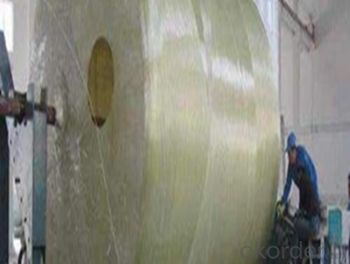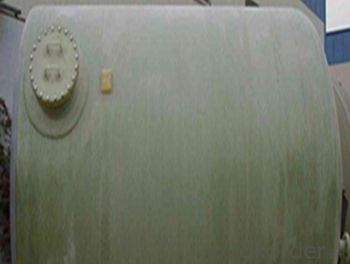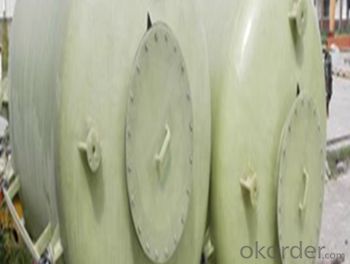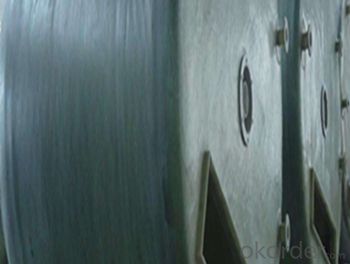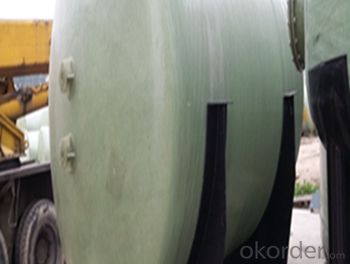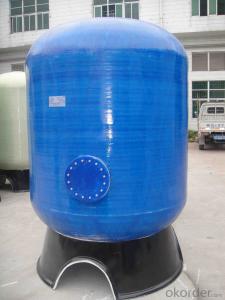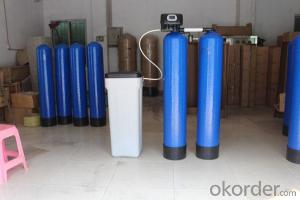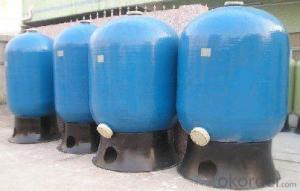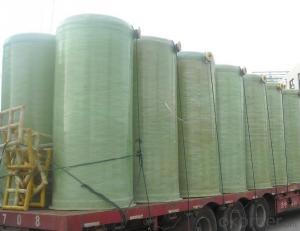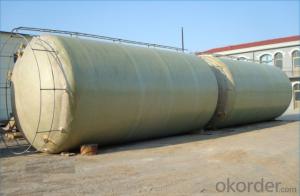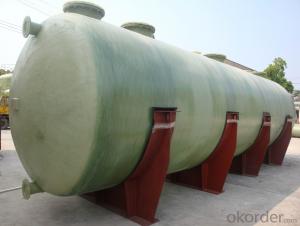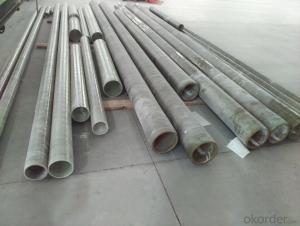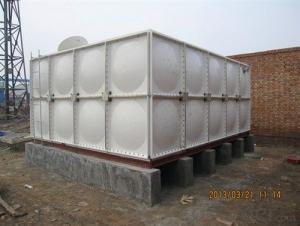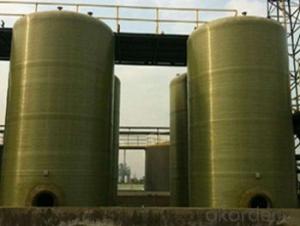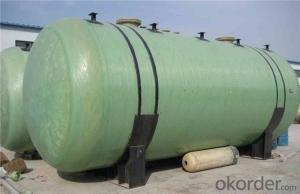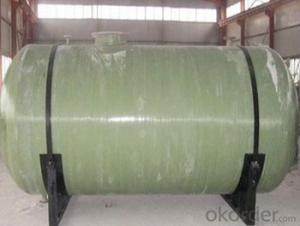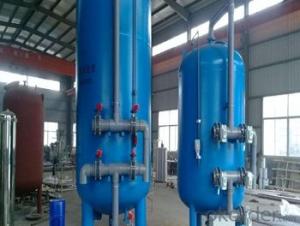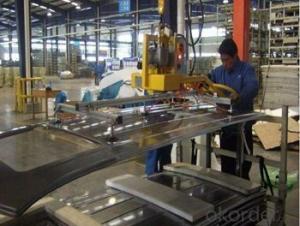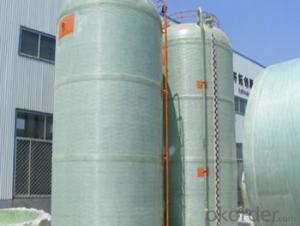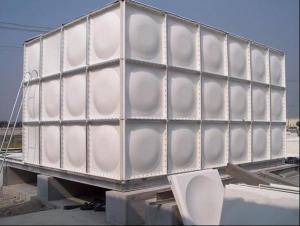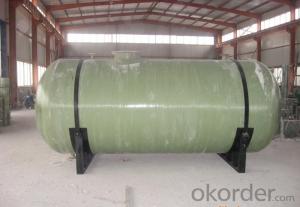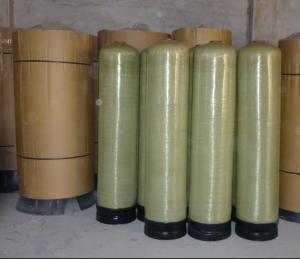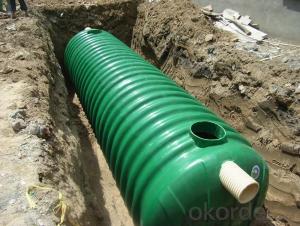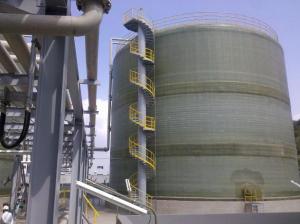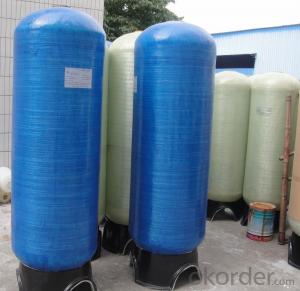FRP tanks and vessels High mechanical inertness for sales
- Loading Port:
- Tianjin
- Payment Terms:
- TT OR LC
- Min Order Qty:
- 4000 m.t.
- Supply Capability:
- 50000 m.t./month
OKorder Service Pledge
OKorder Financial Service
You Might Also Like
Specification
INSTRUCTION
FRP tanks and vessels can be largely used in many areas of the light industry, petroleum, chemical, food brewing, transportation and so on. Such product can resist the corrosion of various acids, alkalis and salts.
CHARACTERISTICS
• High mechanical strength
• High mechanical inertness
• Resistance to weathering
• Low thermal and electrical conductivity
• Long Life
• Non-toxicity
• No need for maintenance
• Light weight
DESIGN PHILOSOPHY
The correct structuring of any kind of G.R.P. tank consist of three distinct types of layers:
• Chemical Resistant Layer
• Mechanically Resistant Layer
• Outer Protective Layer
OTHER DESIGN CONDITIONS
• Working pressure, Vacuum
• Support span
• Working temperature
CHEMICAL RESISTANCE
Resistance to corrosion in aggressive environments is one of
the primary reasons for specifying GRP tanks. These, resists a
wide range of chemicals and temperatures and can be built to
provide additional abrasion, weathering and fire resistance. The
chemical resistance of GRP tank depends primarily on the resin/
glass matrix used. Other factors can affect laminate resistance
including liner construction, cure, and fabrication methodology
and installation techniques.
General corrosion, galvanic, aerobic, pitting, dezincification,
graphitic and intergranular corrosion harm metals but not GRP.
PRODUCTION RANGE
FRP small-scale storage tank: Diameter ≤ 4M
Large-scale jobsite winding vertical storage tank: Diameter 4200mm-25000mm
EXECUTIVE STANDARD
FRP small-scale storage tank
JC/T587-1995 (Glass fiber reinforced plastic storage tank)
Large-scale storage tank
HG/T3983-2007 Industry standards of Chemical Corrosion-resistant jobsite Winding FRP Large-scale storage tank
HG/T20696 Design Requirements of FRP Chemical Equipment
COMPANY INTRODUCTION
CNBM, China National Building Materials Group is a state-owned enterprise in charge of administrative affairs in china building materials industry. Established in 1984, CNBM is a large group corporation of building materials with total assets of 25 billion RMB and a total staff of 30,000.CNBM now owns 200 subordinating firms of solely owned and joint-venture companies.
CNBM International Corporation is one subsidiary of CNBM, we focus on offering good-quality products, professional service and complete solution to our customers. Strong delivery capacity, advanced technology
& management, strong financing capability and excellent after-sale service are our advantages in sharing international market.
PICTURE S
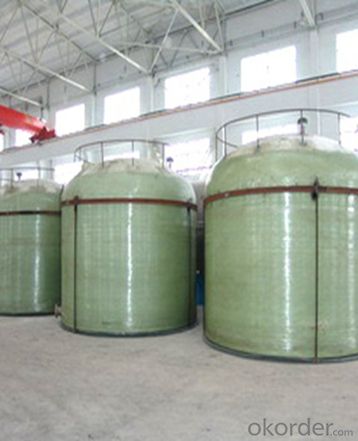
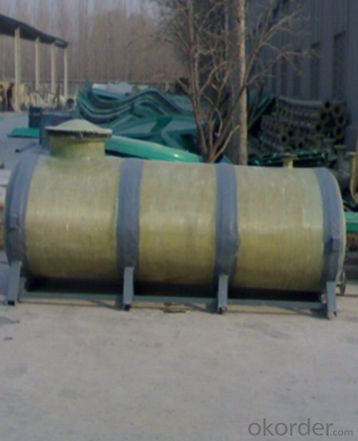
- Q: What are the manufacturers of glass fibre reinforced plastic storage tanks in Guangdong?
- Guangzhou Jing Hui glass fiber reinforced plastics Co., Ltd. is a large glass fiber reinforced plastic production enterprise in Southern China. It has been established for nearly 60 years and has complete facilities.
- Q: In order to compare the fast inspection, the FRP storage tank is leaking
- 1., must be stored in the ground flat, to avoid glass fiber reinforced plastic storage tank collapsed.2., clean up the storage space, do not have hard objects, resulting in damage to glass fiber reinforced plastic storage tanks.3. because of the lower ignition point of glass fiber reinforced plastic storage tanks, it is necessary to keep away from the fire source during storage, and keep the storage space of FRP tanks well ventilated.
- Q: Is FRP tank corrosion resistant?
- Glass steel tank can be divided into vertical storage tank, storage tank, horizontal storage tank, hydrochloric acid sulfuric acid storage tank, transport tanks, fermentation tanks, chemical tanks, glass steel anti-corrosion tank, mixing tank, storage tank, gas tank, nitrate ammonia tank etc..
- Q: Physical properties of FRP tanks
- Good thermal performanceFRP has a low thermal conductivity and is 1.25~1.67kJ/ (M. H. K) at room temperature. Only metal 1/100~1/1000 is a good thermal insulating material. It is an ideal thermal protection and ablative material in the instantaneous ultra high temperature, which can protect the spacecraft from the erosion of high velocity air at temperatures above 2000 degrees celsius.
- Q: There is a storage tank, which was originally village glue, and now prepared to glue on the basis of the village glass fiber reinforced plastic anti-corrosion, can?
- No, it is decided by the characteristic of FRP. It can not stick.
- Q: What are the points for attention in the process of making FRP tanks?
- Just do it easy. Why do you want to do it yourself? It's bad for your health. Just pack it up when you have it. Just give you a rebate.
- Q: Glass fibre reinforced plastic water storage tank
- The use of glass steel tank industry: ferrous metallurgy industry, nonferrous metallurgy industry, electric power industry, coal industry, petrochemical industry, chemical industry, mechanical industry, textile industry, automobile and motorcycle manufacturing industry, railway industry, shipbuilding industry, construction industry, light industry, food industry, electronic industry, telecommunications industry, culture, sports and entertainment industry, agriculture, aquaculture, commercial, medical and health industry, application field and military and civilian applications etc..
- Q: Glass toughened septic tank can out of plastic pipe. How do you fix it?
- Enter the glass steel tank maintenance, should close all the inlet valve, emptying and cleaning tank, after testing confirmed that no toxic gas tank, not to enter into the oxygen tank, the tank should wear soft soled shoes, tied the safety belt and the safety belt on the other end attached to the tank top, tank ventilation attention. Into the tank operation, there must be personnel outside the tank monitoring
- Q: How to determine the quality of FRP?
- To know the quality of glass steel cans to distinguish the quality of the method, first of all let us understand the production process of FRP tanks:The process of making FRP cans can be found from the Internet. At present, there are two main processes for making FRP cans in China: hand paste glass fiber reinforced plastic tank and twisted glass fiber reinforced plastic tank.
- Q: Difference between glass fiber reinforced plastic and insulating board
- (1) FRP tanks: FRP tanks, hydrochloric acid tanks, sulfuric acid tanks, reaction tanks, anti-corrosion tanks, chemical storage tanks, transport tanks, food cans, fire cans, etc.;(2) glass fibre reinforced plastic pipe: glass fibre reinforced plastic pipe, glass fibre reinforced plastic sand pipe, glass fibre reinforced plastic wind pipe, glass fibre reinforced plastic cable tube, glass fibre reinforced plastic pipe jacking, glass fiber reinforced plastic pipe, etc.;
Send your message to us
FRP tanks and vessels High mechanical inertness for sales
- Loading Port:
- Tianjin
- Payment Terms:
- TT OR LC
- Min Order Qty:
- 4000 m.t.
- Supply Capability:
- 50000 m.t./month
OKorder Service Pledge
OKorder Financial Service
Similar products
Hot products
Hot Searches
Related keywords
